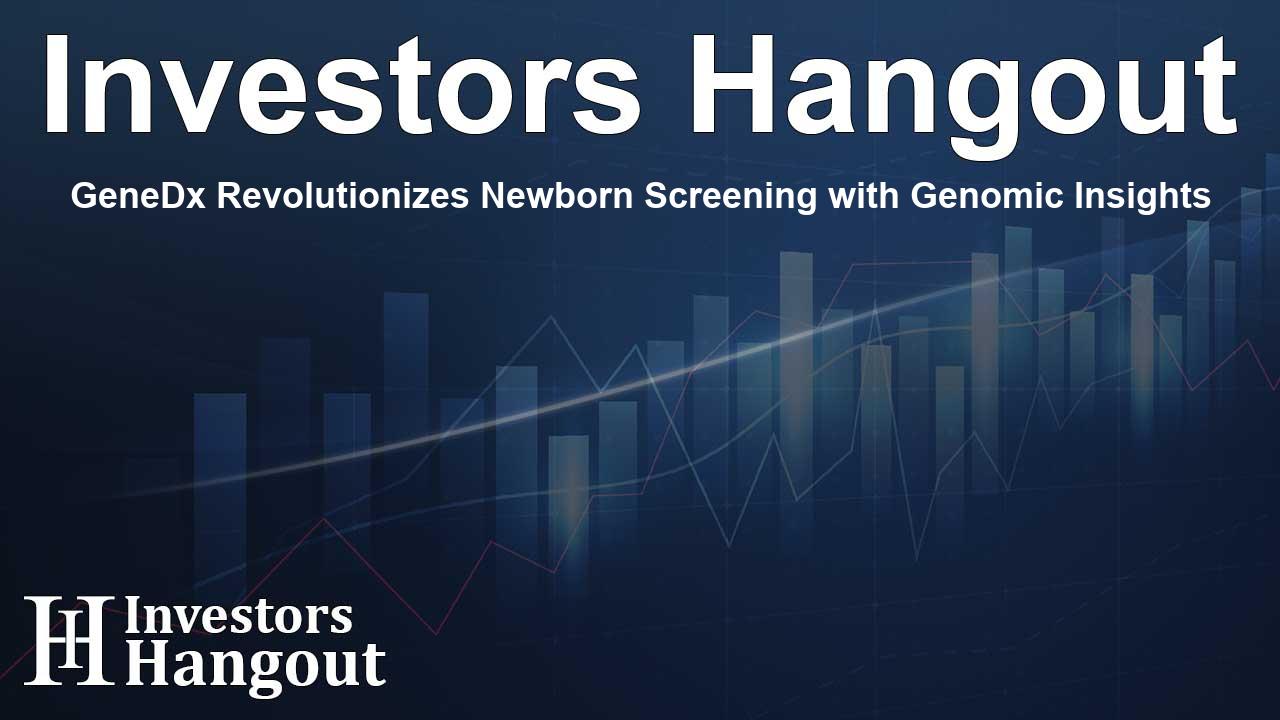GeneDx Revolutionizes Newborn Screening with Genomic Insights

GeneDx Enhances Newborn Screening with Groundbreaking Research
GeneDx, a leader in genomic health solutions, has established itself at the forefront of newborn screening, participating in pioneering research to assist in the early detection of genetic disorders. Through its innovative approach, the company has successfully conducted genomic newborn screenings (gNBS) for over 14,000 newborns. This extensive research aims to integrate genomic sequencing into the standard newborn screening process, paving the way for significant advancements in early diagnosis.
The Importance of Early Diagnosis in Newborns
Timely identification of genetic disorders is vital for improving health outcomes in infants. The ability for gNBS to reduce the time to diagnosis can dramatically impact treatment pathways for conditions with effective interventions. Analysis of GeneDx's extensive database, which includes over 700,000 genomic sequences, revealed that more than 21% of newborns screened would have received a diagnosis much earlier—typically by over eight years—if gNBS had been available at birth.
Challenges and Innovations in Newborn Screening
As the leader in this evolutionary process, GeneDx has participated in several foundational studies, including the GUARDIAN initiative, which has provided gNBS to more than 10,000 infants. The company also contributed to the Early Check project for an additional 2,000 infants. Understanding the complexities involved in implementing gNBS on a wide scale is crucial, and GeneDx's efforts have highlighted the need for a diverse database of clinically significant variants for accurate interpretation.
Addressing the Technical Aspects of gNBS
A robust technical evaluation process is paramount for accurately analyzing sequencing data. GeneDx's expertise allows it to offer clarity in variant interpretation, enhancing the diagnostic process significantly. Dr. Paul Kruszka, Chief Medical Officer at GeneDx, emphasizes the journey from diagnostic uncertainty to clear actionable diagnoses, stating how technological advancements have facilitated quicker and more cost-effective screening for families.
Strong Collaborations to Advance Healthcare
GeneDx's collaborations with renowned institutions such as Columbia University Irving Medical Center and New York-Presbyterian have played a crucial role in the success of GUARDIAN and Early Check studies. These partnerships allow the company to harness collective expertise and resources, enhancing the impact of gNBS in identifying genetic conditions early.
Looking Ahead: The Future of Genomic Newborn Screening
GeneDx is dedicated to ensuring that genomic insights are available for early disease detection, striving towards a future where all genetic disorders can be diagnosed swiftly. The company is committed to making significant contributions to genomic newborn screening, continuously improving processes to support families and prevent the progression of diseases.
Presentations and Insights on Newborn Sequencing
Dr. Kruszka is scheduled to present groundbreaking findings titled “Lessons Learned: 14,000+ Infants Screened with Newborn Sequencing” at an important international conference this week. This presentation will showcase the lessons learned and insights garnered from the extensive data collected through GeneDx's pioneering work in the field.
As GeneDx advances in its mission, the company remains committed to aiding healthcare providers and families in making informed decisions. The hope is to transform the landscape of newborn screening, ensuring that every child has access to the best possible health outcomes.
Frequently Asked Questions
What is genomic newborn screening (gNBS)?
Genomic newborn screening (gNBS) involves utilizing genomic sequencing to detect genetic disorders in newborns at an early stage, allowing for timely intervention and treatment.
How many newborns has GeneDx screened?
GeneDx has screened over 14,000 newborns through its participation in clinical research studies focused on enhancing newborn screening methods.
What are the benefits of early diagnosis through gNBS?
Early diagnosis through gNBS can significantly decrease the time to action for necessary treatments, potentially ensuring better health outcomes for newborns with genetic conditions.
What partnerships does GeneDx have for its studies?
GeneDx collaborates with institutions such as Columbia University Irving Medical Center, New York-Presbyterian, and the North Carolina State Laboratory of Public Health to enhance their genomic screening initiatives.
Where can I find more information about GeneDx?
You can learn more about GeneDx and their innovative work in genomic newborn screening by visiting their official website.
About Investors Hangout
Investors Hangout is a leading online stock forum for financial discussion and learning, offering a wide range of free tools and resources. It draws in traders of all levels, who exchange market knowledge, investigate trading tactics, and keep an eye on industry developments in real time. Featuring financial articles, stock message boards, quotes, charts, company profiles, and live news updates. Through cooperative learning and a wealth of informational resources, it helps users from novices creating their first portfolios to experts honing their techniques. Join Investors Hangout today: https://investorshangout.com/
Disclaimer: The content of this article is solely for general informational purposes only; it does not represent legal, financial, or investment advice. Investors Hangout does not offer financial advice; the author is not a licensed financial advisor. Consult a qualified advisor before making any financial or investment decisions based on this article. The author's interpretation of publicly available data shapes the opinions presented here; as a result, they should not be taken as advice to purchase, sell, or hold any securities mentioned or any other investments. The author does not guarantee the accuracy, completeness, or timeliness of any material, providing it "as is." Information and market conditions may change; past performance is not indicative of future outcomes. If any of the material offered here is inaccurate, please contact us for corrections.